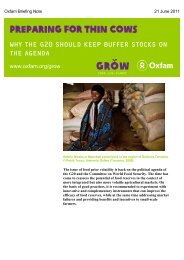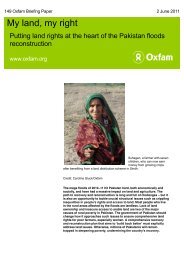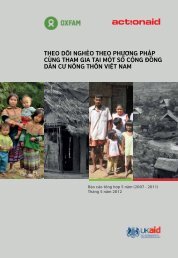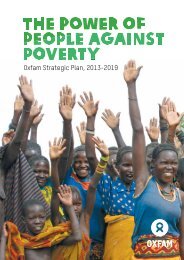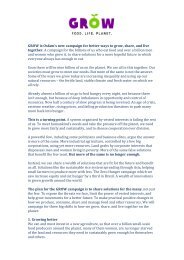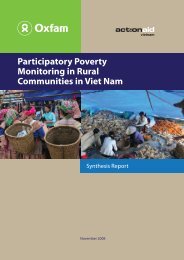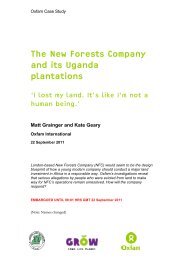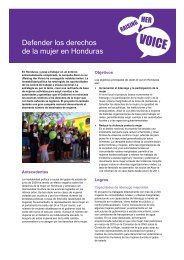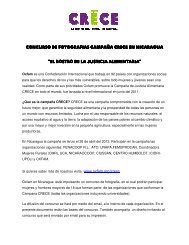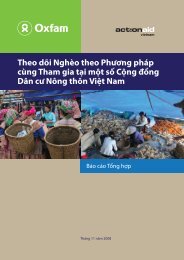Women's Collective Action in the Honey Sector in ... - Oxfam Blogs
Women's Collective Action in the Honey Sector in ... - Oxfam Blogs
Women's Collective Action in the Honey Sector in ... - Oxfam Blogs
You also want an ePaper? Increase the reach of your titles
YUMPU automatically turns print PDFs into web optimized ePapers that Google loves.
Women <strong>in</strong> collective action: Bosena Atnafu<br />
Bosena Atnafu, 40 years old, is seen as one of <strong>the</strong> most<br />
successful women beekeepers <strong>in</strong> Amhara region. She<br />
is a well-respected member of her community and an<br />
executive committee member of Meserethiwot honey<br />
cooperative. She has succeeded <strong>in</strong> spite of hav<strong>in</strong>g had<br />
a relatively difficult childhood, never attend<strong>in</strong>g school<br />
and gett<strong>in</strong>g married at an extremely young age (eight<br />
years old). As a married woman, she had to carry out<br />
all <strong>the</strong> traditional duties and responsibilities expected of<br />
rural mo<strong>the</strong>rs <strong>in</strong> <strong>the</strong> region, without much support from<br />
her first husband and his family. A comb<strong>in</strong>ation of factors<br />
has enabled Bosena to succeed as a bus<strong>in</strong>esswoman,<br />
<strong>in</strong>clud<strong>in</strong>g her personal qualities and skills, her<br />
participation <strong>in</strong> <strong>Oxfam</strong>’s <strong>in</strong>tervention activities, and <strong>the</strong><br />
support of her second husband.<br />
Bosena is known for be<strong>in</strong>g proactive and adopt<strong>in</strong>g new<br />
ideas before o<strong>the</strong>rs <strong>in</strong> her village. It is because of this<br />
quality that she was <strong>the</strong> first woman sent for tra<strong>in</strong><strong>in</strong>g by<br />
<strong>Oxfam</strong> to help form women-only groups <strong>in</strong> <strong>the</strong> area. After<br />
<strong>the</strong> tra<strong>in</strong><strong>in</strong>g, Bosena was asked to select 20 women from<br />
poorer households to jo<strong>in</strong> her <strong>in</strong> establish<strong>in</strong>g a village<br />
women-only group, called Serto Madeg. Her selection<br />
criteria for membership <strong>in</strong>cluded trustworth<strong>in</strong>ess, be<strong>in</strong>g an<br />
active member of <strong>the</strong> community, read<strong>in</strong>ess to work with<br />
o<strong>the</strong>rs, ownership of at least one beehive, and hav<strong>in</strong>g<br />
enough assets to be able to participate <strong>in</strong> group activities.<br />
Bosena likes to try new activities and understand how<br />
th<strong>in</strong>gs work. She had already tried beekeep<strong>in</strong>g on her<br />
own, before <strong>Oxfam</strong>’s <strong>in</strong>tervention, and had studied bees’<br />
anatomy and behaviour <strong>in</strong> detail. Dur<strong>in</strong>g <strong>the</strong> beekeep<strong>in</strong>g<br />
tra<strong>in</strong><strong>in</strong>g sessions provided by <strong>Oxfam</strong>, <strong>the</strong> tra<strong>in</strong>er asked<br />
<strong>the</strong> group a series of questions that no-one but Bosena<br />
could answer. Her knowledge really impressed <strong>the</strong><br />
tra<strong>in</strong>er, who recommended that she become an executive<br />
committee member of <strong>the</strong> honey cooperative.<br />
Under <strong>the</strong> rotational leadership model practised by Serto<br />
Madeg, Bosena was elected as chairperson for <strong>the</strong> first<br />
six months. The o<strong>the</strong>r members believe that <strong>the</strong> example<br />
set by her is <strong>the</strong> reason why <strong>the</strong> group is perform<strong>in</strong>g better<br />
than <strong>the</strong> o<strong>the</strong>r n<strong>in</strong>e groups <strong>in</strong> <strong>the</strong> area, and she is seen as<br />
a role model for o<strong>the</strong>r women <strong>in</strong> <strong>the</strong> village. In addition,<br />
Bosena has been elected to <strong>the</strong> executive committee of<br />
Meserethiwot cooperative, <strong>in</strong> recognition of her leadership<br />
skills and knowledge of beekeep<strong>in</strong>g. The committee<br />
realized that, although she is not literate, she performs very<br />
well at represent<strong>in</strong>g <strong>the</strong> <strong>in</strong>terests of women and attract<strong>in</strong>g<br />
more women members <strong>in</strong>to <strong>the</strong> cooperative. She is <strong>the</strong> first<br />
woman to hold a senior position on <strong>the</strong> committee, which<br />
has broken with <strong>the</strong> traditional th<strong>in</strong>k<strong>in</strong>g that this k<strong>in</strong>d of<br />
position is only for men.<br />
Bosena feels she has a very close and supportive<br />
relationship with her second husband. He encourages<br />
her to go to meet<strong>in</strong>gs and even advises o<strong>the</strong>r husbands<br />
to support <strong>the</strong>ir wives <strong>in</strong> CA group activities. Bosena<br />
recognizes that she would not be able to carry out her<br />
group roles and responsibilities without his help.<br />
Bosena Atnafu stands <strong>in</strong> front of <strong>the</strong> beehives <strong>in</strong> her back garden <strong>in</strong> Debir<br />
Mender. Photo: Tarekegn Garomsa<br />
Bosena appreciates <strong>the</strong> support provided by <strong>Oxfam</strong>,<br />
such as tra<strong>in</strong><strong>in</strong>g, encouragement to take on leadership<br />
positions, and access to f<strong>in</strong>ancial support. <strong>Oxfam</strong> has<br />
also provided her with assets, <strong>in</strong>clud<strong>in</strong>g modern hives and<br />
safety equipment. She says that without <strong>Oxfam</strong>’s support,<br />
“I would rema<strong>in</strong> just like any housewife <strong>in</strong> our village with<br />
no <strong>in</strong>formation about <strong>the</strong> external world… I would not<br />
attend meet<strong>in</strong>gs, let alone lead <strong>the</strong>m… I could only play a<br />
very m<strong>in</strong>or role <strong>in</strong> <strong>the</strong> beekeep<strong>in</strong>g sector.”<br />
For more <strong>in</strong>formation<br />
Visit <strong>Oxfam</strong>’s Wiki on women’s collective action at www.womenscollectiveaction.com<br />
Written by Sally K<strong>in</strong>g, Programme Learn<strong>in</strong>g Officer, <strong>Oxfam</strong> GB. Editors: Imogen Davies and Sally Baden, <strong>Oxfam</strong> GB.<br />
Researchers: Tarekegn Garomsa, Dr. Berhanu Denu and Dr. Car<strong>in</strong>e Pionetti.<br />
The <strong>in</strong>formation <strong>in</strong> this case study is drawn from <strong>the</strong> f<strong>in</strong>al phase of <strong>the</strong> women’s collective action research project. For<br />
fur<strong>the</strong>r <strong>in</strong>formation on this phase, please see S. Baden (2013) ‘Women’s <strong>Collective</strong> <strong>Action</strong> <strong>in</strong> African Agricultural Markets:<br />
The miss<strong>in</strong>g l<strong>in</strong>k for empowerment?’, available to download from http://womenscollectiveaction.com/Phase+III<br />
Front cover: Women cooperative members <strong>in</strong> Amhara load racks taken from a modern hive <strong>in</strong>to a centrifuge that will separate honey from wax. The racks, complete<br />
with wax, will <strong>the</strong>n be replaced <strong>in</strong> <strong>the</strong> hive. Photo: Tom Pietrasik<br />
8



